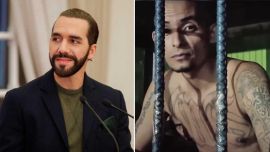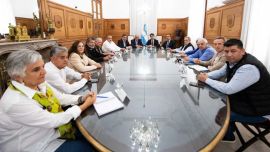The Summit of the Americas drew most of the regional headlines over the weekend, but most observers felt the event’s failure to achieve a strong consensus on Venezuela’s mounting humanitarian and political crisis was the biggest take-away.
Instead, 16 of the 33 nations gathered for the eighth Summit of the Americas issued a statement on the sidelines of the event in Peru calling on Venezuela to hold free and transparent elections and allow international aid to the enter the beleaguered nation.
But the joint statement from mostly conservative-led countries didn’t vary significantly from previous declarations or promise any additional money to help neighbouring countries respond to a mounting migration crisis aside from the nearly US$16 million pledged by the United States Friday.
“I don’t see any progress there,” said Richard Feinberg, a senior fellow at the Brookings Institution who helped organise the first Summit of Americas in 1994.
Leaders from the region did however vow to confront systemic corruption at a time when graft scandals plague many of their own governments.
Though the theme of this year’s gathering of Western Hemisphere leaders was battling corruption, many leaders still used the platform nonetheless to voice their concerns on Venezuela as President Nicolás Maduro proceeds with plans to hold a presidential election that many foreign government consider a sham. Still, there were a handful of Venezuelan allies present including Cuba and Bolivia and the sole joint declaration adopted at the summit was a region-wide commitment to root out corruption.
Tackling graft
The “Lima Commitment: Democratic Governance Against Corruption” includes 57 action points that Peruvian President Martín Vizcarra said would constitute a base for preventing corruption. Analysts are sceptical, however, that it will lead to any tangible change. Many heads of state in attendance lead administrations that face allegations of misusing public funds, obstructing justice and accepting bribes.
“The hard part will come when leaders return home,” said Shannon O’Neil, a senior fellow at the Council on Foreign Relations think-tank. “These initiatives will take much time and effort to implement, and will in many places face significant push back.”
Absent Trump and stalled on Venezuela, perhaps the most notable progress made was on the subject of corruption, a topic the Summit of the Americas first tackled at the initial 1994 gathering. That event led to the ratification of the Inter-American Convention Against Corruption two years later.
Leaders including Vizcarra lamented that two decades later corruption remains just as entrenched if not more so in many public institutions throughout the region.
“That pledge wasn’t achieved,” Vizcarra said in his opening remarks Friday.
Feinberg said the new declaration against corruption is an important step forward, including timely updates aimed at helping improve transparency in the digital age. But he also pointed out that it doesn’t include any new resources for fighting corruption or sanctions for those who don’t comply.
Attendance issues
This year’s summit was one of the least attended yet, raising questions about the future of the regional gathering started in 1994 by then-US president Bill Clinton.
US leader Donald Trump cancelled what would have been his first trip as president to Latin American in order to manage the US response to an apparent chemical weapons attack in Syria. More than a half-dozen other regional presidents followed suit, some in apparent acts of solidarity with Maduro, whose invitation was withdrawn.
US Vice-President Mike Pence said Saturday that the US would submit a bid to host the next summit in 2021 in an apparent act to quell doubts about the nation’s commitment to the region.
The summit’s initial goal was to promote representative democracy and free trade in the Americas, but in recent years both topics have been testy subjects. Instead it has become a stage for awkward encounters between left-leaning leaders and their more conservative counterparts.
Venezuela split
Some of that discord was on display at Saturday’s plenary session, when Cuban Foreign Minister Bruno Rodríguez chastised Pence as “ignoring reality.”
“I reject these insulting references to Cuba and Venezuela,” he said after Pence assailed Maduro as being responsible for Venezuela’s deepening crisis.
Pence, who filled in for Trump, spent part of the summit trying to drum up support for further isolating Venezuela, which faces mounting US sanctions. In a forceful speech he said the US would not “stand idly by while Venezuela crumbles,” but didn’t announce any new measures.
“The United States believes now is the time to do more, much more,” he declared.
US Senator Marco Rubio said that even without a formal declaration on behalf of the summit with an action plan for addressing Venezuela, he nonetheless felt the 16 nations who did sign on represent an important majority in terms of population size and economic might.
“We should do as much as we can together with our partners in the region,” he said.
President Mauricio Macri was one of the most outspoken leaders on Venezuela. In a closely-watched speech that lasted less than 10 minutes, he repeated his earlier declared line that Argentina would not recognise the vote.
“Argentina will not acknowledge any process that is not a democratic election,” he said. "We have to continue working together for a true democratic and peaceful solution for Venezuela," the president said.
Macri also showed his concern for the ongoing humanitarian crisis.
"We have to redouble our efforts so that the government of Venezuela stops denying its reality," he said.
Morales gives boost to Maduro
In a boost to Venezuelan President Maduro, Bolivia's President Evo Morales made a flying visit to Caracas for talks on Sunday, a month ahead of controversial polls set to give the socialist leader a second term.
Morales' visit provided a rare international show of support for Maduro. The leftist Bolivian leader was received with full military honours at Caracas’ presidential palace.
"We are anti-imperialist and no-one is going to blackmail us," Morales said in brief statement to reporters after the one-hour meeting.
"We revolutionaries are recognised by our peoples," Morales said in a brief statement to reporters after the one-hour meeting with Maduro.
The May 20 election would be "void of legitimacy and credibility" if it went ahead under current conditions, the Western Hemisphere nations said in a joint declaration released at the summit in Peru.
Maduro was not invited to the Summit in Lima, but Morales defended him, condemning particularly the US sanctions against Maduro's government and regretting his Venezuelan counterpart's absence – which he blamed on US pressure.
Syrian strikes overshadow Pence’s priorities
In many ways the event was also overshadowed by events happening thousands of miiles away. Pence, for example, was thrust into a new, more immediate, role on the world stage on Saturday: explaining Trump’s military strikes in Syria to the summit of Latin America leaders.
Hours after Trump hailed the missile strike targeting the Syria’s suspected chemical weapons — tweeting, “Mission Accomplished!” — Pence defended the president while building support among US allies for the joint strikes with Britain and France.
“The objective of the mission the commander-in-chief gave our military forces and our allies was completely accomplished — with swift professionalism,” Pence told reporters, noting there were “no reported civilian casualties.”
Later, speaking in the cavernous hall containing world leaders, Pence expressed gratitude to Canada, Colombia and other nations that had voiced support for the strike and urged “every nation in this hemisphere of freedom” to support the military action.
Shortly before Trump’s address to the nation Friday night, Pence was whisked away from the summit in his motorcade so he could return to his hotel to inform congressional leaders of the pending missile strikes. Pence watched Trump’s speech from his hotel suite, joined by aides.
Unlike past appearances at international summits, the vice-president had to dive into the packed agenda on short notice. He learned only Tuesday that he would be attending in Trump’s place so the president could manage the US response to Syria.
In meeting after meeting, Pence offered a low-key, extended hand.
Seeking rapprochement with Mexico, which has been at odds with Trump over the border wall and immigration, Pence said the topic of funding for Trump’s long-promised border wall did not come up in his meeting with Mexican President Enrique Peña Nieto.
Pence said they simply had a difference of opinion and some issues were “set aside, for a later date.” Left unsaid was whether Pence’s overtures might eventually lead to a joint Trump-Peña Nieto meeting, their first.
Seated alongside Trudeau, Pence said there was a “real possibility” the US could reach a deal with Canada and Mexico on NAFTA “within the next several weeks.” Trump has long assailed the trade deal’s impact on US workers and threatened to pull the US out if he’s unhappy with the terms.
- TIMES/AP/AFP


























Comments